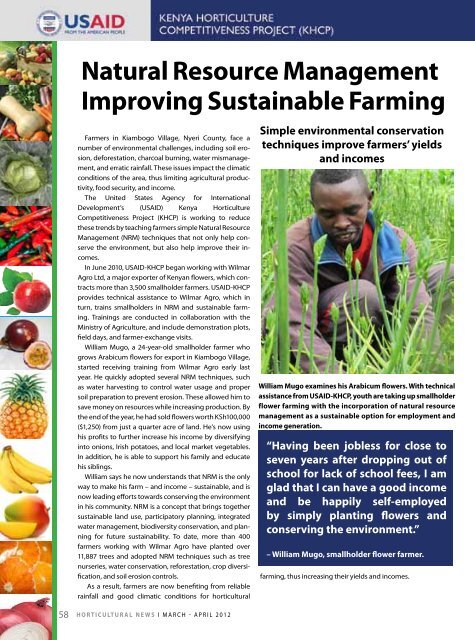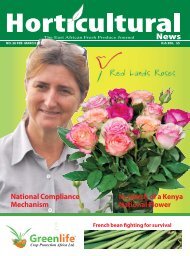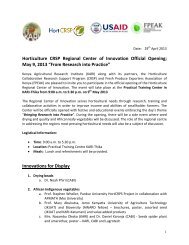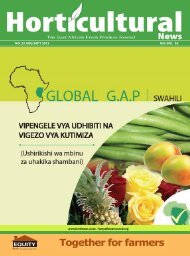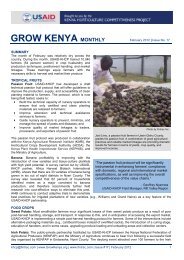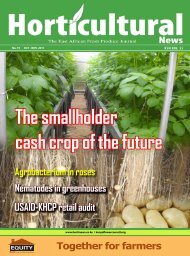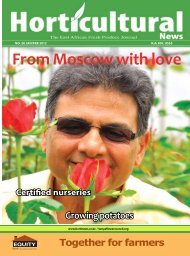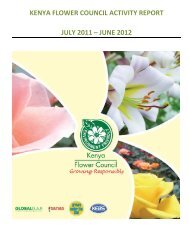April Issue - Hortinews.co.ke
April Issue - Hortinews.co.ke
April Issue - Hortinews.co.ke
Create successful ePaper yourself
Turn your PDF publications into a flip-book with our unique Google optimized e-Paper software.
TRODUCES PROFESSIONAL<br />
ETIES……….<br />
EN TASTE IS BACK WITH MORE<br />
URES<br />
Glossy attractive head type<br />
<strong>co</strong>ok glossy looking heads of an average head<br />
agen taste and the lost slogan of Bachelors’ variety.<br />
ure in only 55 days in hot areas and 60 days in <strong>co</strong>ld<br />
rofiting plant population of 50,000 plants/ Ha or<br />
a or 60T/Acre. The <strong>co</strong>nventional varieties give<br />
00 plants /Acre at a spacing of 60cm x 60cm.<br />
58<br />
Natural Resource Management<br />
Improving Sustainable Farming<br />
Farmers in Kiambogo Village, Nyeri County, face a<br />
number of environmental challenges, including soil erosion,<br />
deforestation, char<strong>co</strong>al burning, water mismanagement,<br />
and erratic rainfall. These issues impact the climatic<br />
<strong>co</strong>nditions of the area, thus limiting agricultural productivity,<br />
food security, and in<strong>co</strong>me.<br />
The United States Agency for International<br />
Development’s (USAID) Kenya Horticulture<br />
Competitiveness Project (KHCP) is working to reduce<br />
these trends by teaching farmers simple Natural Resource<br />
Management (NRM) techniques that not only help <strong>co</strong>nserve<br />
the environment, but also help improve their in<strong>co</strong>mes.<br />
In June 2010, USAID-KHCP began working with Wilmar<br />
Agro Ltd, a major exporter of Kenyan flowers, which <strong>co</strong>ntracts<br />
more than 3,500 smallholder farmers. USAID-KHCP<br />
provides technical assistance to Wilmar Agro, which in<br />
turn, trains smallholders in NRM and sustainable farming.<br />
Trainings are <strong>co</strong>nducted in <strong>co</strong>llaboration with the<br />
Ministry of Agriculture, and include demonstration plots,<br />
field days, and farmer-exchange visits.<br />
William Mugo, a 24-year-old smallholder farmer who<br />
grows Arabicum flowers for export in Kiambogo Village,<br />
started receiving training from Wilmar Agro early last<br />
year. He quickly adopted several NRM techniques, such<br />
as water harvesting to <strong>co</strong>ntrol water usage and proper<br />
soil preparation to prevent erosion. These allowed him to<br />
save money on resources while increasing production. By<br />
the end of the year, he had sold flowers worth KSh100,000<br />
($1,250) from just a quarter acre of land. He’s now using<br />
his profits to further increase his in<strong>co</strong>me by diversifying<br />
into onions, Irish potatoes, and local mar<strong>ke</strong>t vegetables.<br />
In addition, he is able to support his family and educate<br />
his siblings.<br />
William says he now understands that NRM is the only<br />
way to ma<strong>ke</strong> his farm – and in<strong>co</strong>me – sustainable, and is<br />
now leading efforts towards <strong>co</strong>nserving the environment<br />
in his <strong>co</strong>mmunity. NRM is a <strong>co</strong>ncept that brings together<br />
sustainable land use, participatory planning, integrated<br />
water management, biodiversity <strong>co</strong>nservation, and planning<br />
for future sustainability. To date, more than 400<br />
farmers working with Wilmar Agro have planted over<br />
11,887 trees and adopted NRM techniques such as tree<br />
nurseries, water <strong>co</strong>nservation, reforestation, crop diversification,<br />
and soil erosion <strong>co</strong>ntrols.<br />
As a result, farmers are now benefiting from reliable<br />
rainfall and good climatic <strong>co</strong>nditions for horticultural<br />
H O R T I C U LT U R A L N E W S I m a r c h - a p r i l 2 0 1 2<br />
<br />
<br />
<br />
<br />
and in<strong>co</strong>mes<br />
Simple environmental <strong>co</strong>nservation<br />
techniques improve farmers’ yields<br />
<br />
William Mugo examines his Arabicum flowers. With technical<br />
assistance from USAID-KHCP, youth are taking up smallholder<br />
flower farming with the in<strong>co</strong>rporation of natural resource<br />
management as a sustainable option for employment and<br />
in<strong>co</strong>me generation.<br />
<br />
<br />
<br />
<br />
“Having been jobless for close to<br />
<br />
seven years after dropping out of<br />
school for lack of school fees, I am<br />
glad that I can have a good in<strong>co</strong>me<br />
<br />
and be happily self-employed<br />
<br />
by simply planting flowers and<br />
<br />
<strong>co</strong>nserving the environment.”<br />
<br />
<br />
– William Mugo, smallholder flower farmer.<br />
<br />
farming, thus increasing their yields and in<strong>co</strong>mes.


